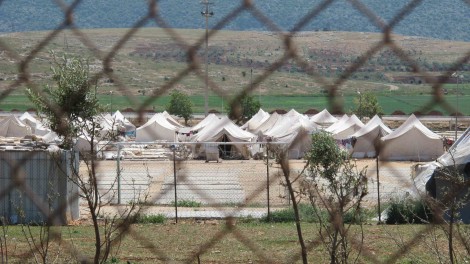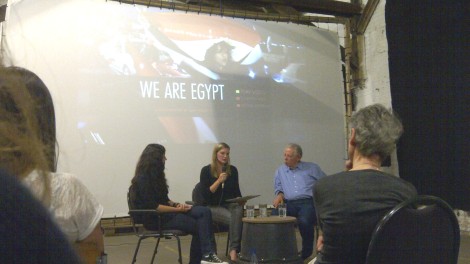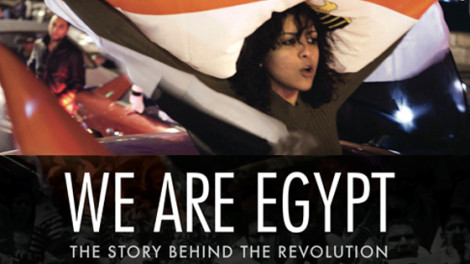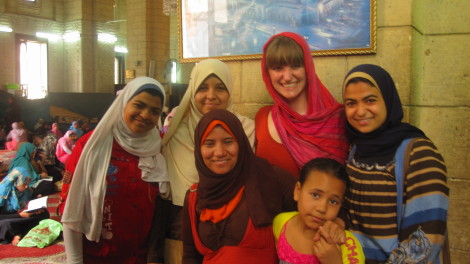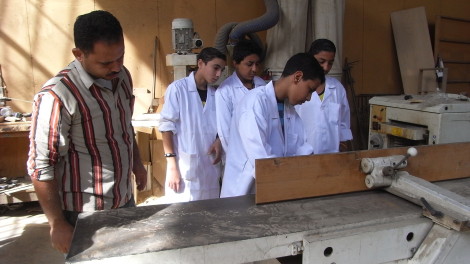News
Arab Film and Discussion Evening on Jordan, October 10th, 2013
„Recycle“ (Documentary), 7:30pm at Filmrauschpalast, Lehrter Straße 35, Berlin Moabit We cordially invite you to our film and discussion evening on Jordan, which will take place on 10 October at 7:30pm in the context of our Arab Film and Discussion Series. We will be screening the documentary “Recycle” by film maker Mahmoud al Massad (2007, 82mins, Arabic with English subtitles). The film tells the personal story of an ex jihadist who lives in one of the poorest areas of the Jordanian city Zarqa. He collects waste-paper in order to make a living for himself and his family. In these difficult circumstances he resorts to religion. But the lack of social and economic prospects and permanent setbacks drive him to the brink of desperation. The borders between “good” and “bad” are getting blurred, not only for the main character but potentially also for certain on-lookers. The film will be followed by a discussion with political scientist Hanna al-Taher, a group of Jordanian exchange students and Jordanian Moabiters, focussing on the situation of Palestinian and Syrian refugees in Jordan as well as on the effects of the so-called “Arab spring” on the country. The evening will take place in English. Attendance is free, donations are welcome. The event will take place at Filmrauschpalast, in the Kulturfabrik Berlin Moabit, Lehrter Str. 35. You can see here where the Kulturfabrik is located.
The Suffering Grasses of Syria – Report on the Third Arab Film and Discussion Series
On Wednesday 18th September 2013 our third Arab Film and Discussion Evening took place - this time it was about Syria. In the documentary "THE SUFFERING GRASSES : when elephants fight, it is the grass that suffers " from Iara Lee, the conflict in Syria is represented (at the time of 2012). Different interviews, pictures, animated sequences and reports on the war events reflect the sorrow and the frustration of the Syrian civili society, who is often forced, in view of the hopelessness of the civil war situation, to participate in violent disputes or to run away and a live in refugee camps. The film also deals with the role in the conflict of other countries like Russia, China and the USA. After the film screening, Hanna Wettig from "Adopt a revolution" spoke about the Syrian civil war, the rising tension within different social and political groups in the Syrian society and answered numerous questions and comments from the public. Besides, she explained the work of "Adopt a revolution", about current projects, challenges and also critized the work of the association. Many questions and remarks from the public referred to the refugee's problem and to the (real and potential) role of Germany in this context. Also the current debate about a military intervention and the negotiations about the Syrian chemical weapons was evoked. The evening ended with considerations on a future solution of the conflict and support possibilities coming from the German society. The event, attented by approx. 30 participants, was presented by Anja Gebel (14 km), at the organization helped Johanna Kramer (trainee by 14 km) as well as the ZK/U team. We thank all guests for their coming and for the engaged participation in the discussion! -- 14km Arab Film and Discussion Series In regular intervals we screen films which deal with different Arab countries and subsequently discuss the films and current social and political situation in the respective countries with guests from Berlin Moabit as well as with country experts, always trying to make a link to North-South relationships.
Third Arab Film Evening on September 18, 2013 “The Suffering Grasses” (Syria)
„THE SUFFERING GRASSES“ (documentary and discussion on Syria) on September 18, 2013, at 7:30pm, ZK/U, Siemensstraße 27-49, Berlin Moabit ‚14km – the shortest distance between North Africa and Europe‘ e.V. and the ZK/U cordially invite you to the third event of our Arab Film and Discussion Series. On September 18, 2013, at 7:30pm we will be screening the film „THE SUFFERING GRASSES: when elephants fight, it is the grass that suffers” (2012, 52mins, Language: Arabic/English with German subtitles) and look forward to a subsequent discussion on the situation in Syria. The documentary by Lara Lee depicts the current civil war in Syria, reflected in interviews, pictures, animated sequences and reports about the ongoing occurrences. The film focuses on the situation of the civil society which is often forced either to join the violence or to flee the country. The film also addresses the role of other countries such as Russia, China or the US in the conflict. Against the background of the film we invite you to take the opportunity and discuss the Syrian civil war, the tensions inside the Syrian society and the role of external actors with Syrians living in Moabit as well as with Hannah Wettig from “Adopt A Revolution”. Can external actors contribute to solving the conflict or not? How do people in Syria think about an eventual international intervention? How could the conflict be solved otherwise? (Presented by: Anja Gebel, 14km e.V.). Attendance is free, donations are welcome. 14km Arab Film and Discussion Series In regular intervals we screen films which deal with different Arab countries and subsequently discuss the films and current social and political situation in the respective countries with guests from Berlin Moabit as well as with country experts, always trying to make a link to North-South relationships. Our Arab Film and Discussion Series started on 22 August 2013 with an evening on Egypt. Our second event (on 4 September 2013) dealt with displacement and migration in/from Palestine.
This was our second Arab Film and Discussion Event (Palestine)
Our second Arab Film and Discussion Event was again well attended – on the 4 of September at 7:30pm around 40 participants had arrived at ZK/U in order to watch the film “Turtle’s rage”and to subsequently discuss the film and the topic of Palestinian displacement and migration with our four guests. The film approaches the topic on a very personal level. Young German filmmaker Pary El-Qalqili attempts to get closer to her Palestinian father and understand his life history through many questions and a joint trip to Palestine, simultaneously shedding light on his broken dreams and following his difficult search for home and identity. In the following talk with Musa El-Qalqili (main character of the film), Abdallah Hajjir (Imam at Haus der Weisheit in Moabit), Osama Hajjir (student of international business from Moabit) and Bernhard Schäfer (Joint Initiative on International Humanitarian Law in the Middle East) the discussion centred around the role of displacement and migration in the lives of Palestinians and in particular in the individual and family histories of the present persons with Palestinian migration background, and the different ways of dealing with it. Against the background of the Middle East conflict the audience also brought up the question how Germany could use its political influence more effectively for improving the situation of Palestinian refugees. The event was presented by Anja Gebel (14km e.V.), we would like to thank Johanna Kramer (intern at 14km e.V.) and the ZKU team for their organisational help and support. We thank the audience for their participation!
Second event of our Arab Film and Discussion Series (Palestine): “Turtle’s rage”, September 4th, 2013
„Turtle’s rage“ (Biography / Documentary and Discussion) On 4 September 2013 at 7:30pm, ZK/U, Siemensstraße 27-49, Berlin Moabit 14km – the shortest distance between North Africa and Europe e.V. and the ZK/U cordially invite you to the second event of our Arab Film and Discussion Series. On 4 September 2013 at 7:30pm we will be showing “Schildkrötenwut” (or “Turtle’s rage”, 2012, 69mins, language: German/Arabic with German subtitles) and are looking forward to an interesting discussion about Palestine. The documentary by Pary El-Qalqili tells the story of her father, a Palestinian living in German. The author tries to understand why her father left his family in Berlin in order to build a new life in Palestine, but came back years later and since then is living in the basement of the house, withdrawn like a turtle in its shell. Through many questions and a joint trip to Palestine Pary El-Qalqili aims to find out more about her father, and at the same time uncovers his inner forlornness and sheds light on his difficult search for identity. Against the background of the film you have the opportunity to discuss the situation of Palestinian migrants and questions of identity with Moabiters with Palestinian background and Musa El-Qalqili, the director’s father and main character of the film. We would also like to talk about the (actual and potential) German role in this context: What does Germany do to mediate in the Middle East conflict and to improve the situation of Palestinians? What could the German society do in this regard? (The discussion will take place in German. Presenter: Anja Gebel, 14km e.V) Attendance is free, donations are welcome. -- In regular intervals we screen films which deal with different Arab countries and subsequently discuss the films and current social and political situation in the respective countries with guests from Berlin Moabit as well as with country experts, always trying to make a link to North-South relationships. Our first event of this kind dealt with the social dynamics that have led to the revolution in Egypt in 2011.
Successful start of the Arabic Film and Discussion Series at ZK/U
Our 14km Arabic Film and Discussion Series started successfully with yesterday's screening of "We Are Egypt", followed by a discussion about the film and the current situation in Egypt. We were happy to welcome around 70 guests who had come to watch the documentary by Lillie Paquette and discuss with Barbara Bishay from Mayadin Al-Tahrir and Mustafa Fahim, resident of Moabit, in the premises of the former railway depot Moabit. The film documents the 14 months preceding the Egyptian Revolution of 2011. The filmmaker concentrates on the April 6 youth movement but also interviews and presents the views of many other relevant social and political groups, thus tracing in a very informative way the events and dynamics which culminated in the revolution. In the subsequent discussion, Barbara Bishay, who had just come back from a visit to Egypt, gave an impressive account of current events, debates and the atmosphere among the Egyptian population, while Mustafa Fahim assessed the current situation with the distance and expertise of an Egyptian who has been living in Germany for 54 years. The event was presented by Anja Gebel (14km e.V.), Johanna Kramer (intern at 14km e.V.) and the ZK/U team provided their valuable organisational support. We would like to thank all guests for coming and the ZK/U for the awesome cooperation.
Film: „We Are Egypt – The Story Behind The Revolution“, 22.8.13
„We Are Egypt – The Story Behind The Revolution“, 22.8.13, at ZK/U Berlin (Siemensstr. 27) (Documentary and Discussion) 14km - the shortest distance between North Africa and Europe e.V. and ZK/U cordially invite you to the first event of our Arab film screenings series. In regular intervals we screen movies dealing with different Arab countries and subsequently discuss the films as well as the social and political situation in the respective country with guests from Moabit as well as with country experts, always making a link to North-South relationships. On August 22, 2013, at 7.30 pm, we start the series with the screening of "We Are Egypt – The Story Behind The Revolution” (2013, 82min, Language: English/Arabic with English subtitles), followed by a discussion. Location is ZK/U, Berlin Moabit, Siemensstr. 27-49. For directions klick here. The documentary by young US American film maker Lillie Paquette documents the 14 months preceding the Egyptian Revolution of 2011. Featuring an impressive number of personal interviews, many recordings in Egypt and detailed background information, it describes the (still relevant) political dynamics, the accumulated grievances of the population and the growing demands for social and political change that finally culminated in the overthrow of the Mubarak dictatorship in January 2011. At the same time, the film highlights the dubious role of the USA in the political affairs of Egypt. After the screening, and against the background of the film, the audience has the opportunity to discuss Egypt’s current situation with Egypt experts from Moabit as well as with Barbara Bishay from Mayadin Al-Tahrir (presented by Anja Gebel, 14km e.V.). Attendance is free, voluntary donations are most welcome.
Vierwöchiges Praktikum in der ägyptischen NGO “New Horizon Association for Social Development“ in Kairo
"Ein einmonatiger Aufenthalt in Kairo liegt hinter mir. Nie zuvor bin ich auf dem afrikanischen Kontinent gewesen oder in einem arabisch-sprachigen und muslimischen Land. Mein Praktikum ermöglichte es mir, all dies zu erleben – und das nicht als Touristin, sondern als Einwohnerin Kairos, als Praktikantin in einer lokalen NGO, mit einem Alltag. Ich habe die fremde, gigantische Stadt zu der meinen gemacht, einem Ort mit dem ich nun viel verbinde und auf Erfahrungen zurückblicke, die ich nicht missen möchte. Während ich mir anfangs auf Kairos Straßen auf der Rückbank im Taxi völlig aufgeschmissen vorkam und über keinerlei Orientierung oder Anhaltspunkte verfügte, veränderte sich dies mit der Zeit und bald kannte ich die Wege von Zuhause nach Downtown oder zu meinen Freunden. Ich wusste, wann der Fahrer wo abbiegen musste, wusste, an welchen Ecken es sich besonders staute und konnte auf dem Nachhauseweg das Taxi durch die schnell gelernten Worte shimel (links), yemin (rechts) und alatul (geradeaus) bis vor meine Haustür lotsen. Ich habe mit zwei jungen Frauen in einer wunderschönen Wohnung im Stadtteil Mohandeseen gelebt. Die beiden behandelten mich wie eine langjährige Freundin und ich erfuhr, was es mit der ägyptischen Gastfreundschaft auf sich hat. Häufig waren Freunde zu Besuch und an einem Abend fand eine große Party auf unserer Dachterrasse statt. Ich genoss es, durch meine Mitbewohnerinnen einen Einblick in eines der vielen Gesichter Ägyptens zu erhalten. Der Weg zur Arbeit dauerte eine ganze Stunde. Ich nahm ein Taxi zum Tahrir-Platz, stieg dort in die Metro und musste dann noch eine kurze Strecke Minibus fahren. Vor der Fahrt mit dem Bus traf ich mich immer mit einigen meiner Kollegen um dieses letzte Stück nicht alleine fahren zu müssen. Denn seit der Revolution überschatten Vorfälle sexueller Belästigung die Nutzung öffentlicher Verkehrsmittel, weshalb zu Vorsicht aufgerufen wird. In der Metro gibt es Abteile, die nur Frauen und Kindern den Zugang erlauben. Ich habe immer diese Wagen genommen. Anfangs war es seltsam für mich, eine der wenigen unverschleierten Frauen im Abteil zu sein. Ich trug immer lange Hosen und Shirts mit Ellbogen-langen Ärmeln und wusste dennoch nicht, welches Bild ich verkörperte. Nach vielen Blickkontakten und Zulächeln, sowie schüchternen Fragen woher ich käme und was ich hier mache, wurde mir klar, dass ich mich nicht unwohl zu fühlen brauchte. Denn auch wenn ich durch mein Äußeres auffiel, so wurde dies positiv aufgenommen und die Menschen gaben mir das Gefühl, willkommen zu sein. Ein Erlebnis, was diese Tatsache noch besser verdeutlicht, hat in Alexandria stattgefunden. An meinem zweiten Wochenende in Ägypten fuhr ich mit einer Freundin (auch eine deutsche Praktikantin) dorthin. Wir schlenderten die Promenade am Meer entlang und zum ersten Mal betraten wir eine Moschee. Es war Freitag und viele Menschen tummelten sich auf dem Vorplatz, weshalb wir etwas unsicher wurden, wie unsere Anwesenheit aufgenommen werden würde. Wir betraten den Bereich, in dem die Frauen sich aufhalten. Sie saßen zusammen, beteten, unterhielten sich, telefonierten, aßen und tranken. Nach wenigen Minuten waren meine Freundin und ich umringt von Frauen und Kindern, die sich nach unseren Namen, unserer Herkunft und unserem Alter erkundigten und freudestrahlend feststellten, dass wir uns wohl in der Moschee fühlten. Wir erlebten ein großes Interesse gegenüber unserer Person und unglaublich viel Zuneigung, kommuniziert durch Lächeln und Komplimente. Eine alte Frau küsste uns und ohne Worte verstanden wir ihr Willkommen. Auch wurden viele Gruppenfotos gemacht, denn jeder wollte mal mit uns abgelichtet werden. Mir wurden eine Kette und ein Armreif geschenkt und ich konnte kaum glauben, was da gerade vor sich ging. Als wir nach guten zwei Stunden die Moschee verließen, waren wir voller Glücksgefühle und erklärten unser „Moschee-Erlebnis“ zum Höhepunkt unserer Alexandria-Reise. Zurück zum Alltag: Das Büro der NGO „New Horizon Association for Social Development“ ist in “Old Cairo”. Ich arbeitete im Fundraising-Office, dessen Mitarbeiter dafür zuständig sind, nach Ausschreibungen für Fördergeldvergaben zu suchen und Projektanträge zu verfassen. Dies impliziert Brainstorming und Ideenentwicklung für potenzielle Projekte, die dem Leitbild der Organisation entsprechen. Konzepte, die entstanden, während ich dort im Büro arbeitete, drehten sich beispielsweise um Trainings für junge Mütter, deren Kinder Erscheinungen von Mangelernährung zeigen, oder um ein Netzwerktreffen verschiedener ägyptischer Jugendorganisationen, die sich friedlich für den politischen Wandel im Land einsetzen. Daneben hatte ich aber auch Gelegenheit, andere Projekte der NGO zu besuchen, wie z.B. ein Straßenkinderzentrum in dem sehr armen Viertel Ezbet Chayrallah. Meine Kollegen (eine Ägypterin, ein Australier und ein Italiener) wiesen mich bei der Büroarbeit geduldig ein und sorgten durch ihre offene und freundliche Art für eine sehr angenehme Atmosphäre. So fühlte ich mich wohl und lernte neben dem Schreiben von Fördergeldanträgen (geschieht alles auf Englisch) auch die ägyptische Arbeitsweise und Struktur einer lokalen Organisation kennen. Mein Chef hatte mir gestattet, einige Urlaubstage zu nehmen, da ich ja im Land sei, um dieses kennen zu lernen und nicht nur, um meine Arbeit am Computer zu verrichten. So konnte ich neben den vielen Sehenswürdigkeiten in Kairo auch die Pyramiden, Alexandria, einen Teil der ägyptischen Wüste (Black-and-White Desert) und das Rote Meer (Dahab) besuchen. Ich habe wirklich viel in dem einen Monat in Ägypten unternommen und versucht, möglichst viele Gesichter dieses vielfältigen Landes kennen zu lernen. Natürlich bin ich auch mit den Auswirkungen der gegenwärtigen politischen Situation im Land in Berührung gekommen. Die Frustration unter den jungen Menschen, die sich für den Rücktritt Hosni Mubaraks und einen Wandel hin zu Demokratie und mehr Freiheit eingesetzt haben, ist groß. Die wirtschaftlich missliche Lage und die ausbleibenden Touristen haben zu erhöhter Armut und Kriminalität geführt. Vorfälle sexueller Belästigung, die auch bei Demonstrationen im furchtbarsten Maße stattfinden, schwächen das Vertrauen der Menschen zueinander. Am 30. Juni wird Mohammad Mursi ein Jahr Präsident sein und die Vorbereitungen für einen erneuten Aufstand in Ägypten laufen auf Hochtouren. Es werden Unterschriften gesammelt, die ihn zum Rücktritt veranlassen sollen, Plakate aufgehängt und Flyer verteilt. Es sind große Demonstration angekündigt zu deren Teilnahme auch ich häufiger auf der Straße eingeladen wurde. Wieviel Gewalt und auch Wandel dieses anstehende Datum mit sich bringen wird, werde ich allerdings nicht mehr vor Ort miterleben. Ich bin wieder zurück in Berlin und setze mein Praktikum bei 14km e.V. fort. Bei strahlendem Sonnenschein genieße ich es, eine kurze Hose tragen zu können. Rückblickend kommt mir mein Aufenthalt in Ägypten fast vor wie ein schöner, intensiver Traum, der mir Einblicke ermöglicht hat, die alles übertreffen, was ich vor meiner Abreise erwartet habe." Die von uns wiedergegebenen Berichte von durch uns vermittelte Praktikant/innen spiegeln nicht notwendigerweise die Sichtweise von 14km e.V. oder unseren Partnern wider.
Your shoes for traineeships in Egypt!
The donations campaign described below has finished. Currently, you can donate shoes to 14km and support our work. For doing so, please visit www.shuuz.de, enter our collection number 1081 and our post code 10559. Thank you very much! Take part in a quite special fundraising campaign: give your used shoes, therewith slum children from Egypt could received an education Since the revolutions and revolts in Tunisia, Egypt, Libya and Syria, people are fighting for freedom and democracy. But many obstacles are still put in the way of the the transformation processes. Many people are extremely poor and have no future perspective. With your shoes donation you can make a contribution to peaceful development in Egypt! 14km supports therefore the project "Children At Risk". It helps young people (from 15) from the slum quarter Ezbet Chayrallah in Cairo, who already from childhood live in dangerous and unhealthy working conditions due to social circumstances. Within the framework of the project, these young persons are trained as carpenters and bakers and they are then supported in their search for a working position. They get so a perspective and the possibility to determine their(her) life independently. So they get a perspective and the possibility to govern their own lives. To help is very easy : Visit our shop window under www.shuuz.de, then enter here our collective number 1081 as well as our postal code 10559, and print free of charge a package stamp. With it you can send for free your shoes (from 5 kgs - ask friends!) to the organization Shuuz, which converts it into a cash donation and transfers it to our account. 14Km supports at 100% the project "Children At Risk" in Cairo with your donation Even if it is only 1 pair of shoes - your contribution makes a difference! Many thanks for your donation!
Egyptian Flavour commits to donate to Cairo street children project
!!! GOOD NEWS !!! 3 Euros of every ticket that is being sold for the bellydance show Egyptian Flavour (taking place on May 25, 2013 in the Tempodrom in Berlin) go to 14km e.V. ! The organisers of Egyptian Flavour - Catherine Mancera, Almira Almaas, Shalymar und Hisham Osman - have decided to make this donation to support a Cairo street children project of one of 14km's partner organisations in Egypt, the New Horizon Association for Social Development (NHASD). 14km and its partner NHASD say thanks a million!!! Find out more about Egyptian Flavour as well as the supported project at http://www.egyptian-flavour.de/index.html and http://www.egyptian-flavour.de/tickets.html.



